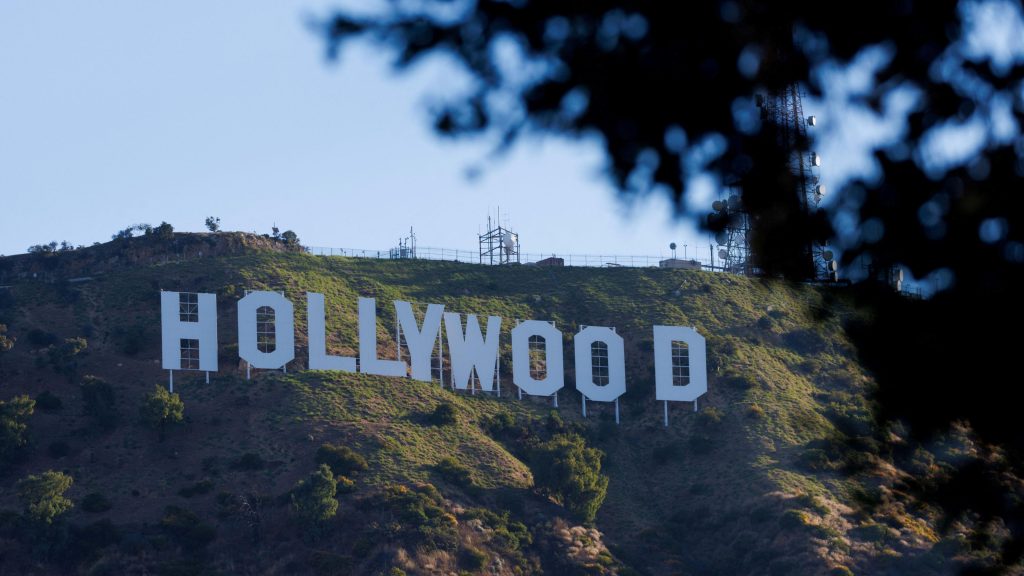
Michael Fortin was once emblematic of Hollywood’s vibrant streaming era. An actor and aerial cinematographer, he transformed his passion for flying drones into a thriving business in 2012, coinciding with the rapid expansion of platforms like Netflix and Amazon. For a decade, Fortin captured stunning aerial footage for major films and television shows. Now, however, he finds himself on the brink of homelessness after being evicted from his home in Huntington Beach and facing eviction again from his Las Vegas apartment.
“We were saving to buy a house, we had money, we did everything right,” Fortin recalls. “Two years ago, I didn’t think twice about spending $200 on dinner with my family. Now, I worry about spending $5 at McDonald’s.”
For years, the film industry thrived as studios scrambled to compete in the burgeoning streaming market. However, the landscape shifted dramatically in May 2023 when Hollywood’s writers went on strike. This marked the first time since the 1960s that both writers and actors united in a labor action that effectively halted production across the industry. But even after the strikes ended, the anticipated rebound in film and TV production never materialized.
In the year following the strikes, many projects were scrapped, and jobs dwindled, leading to widespread layoffs across studios, with Paramount recently announcing a second round of cuts. The company aims to reduce its workforce by 15% in anticipation of a merger with Skydance.
Unemployment in the U.S. film and TV sector reached 12.5% in August, although many believe this figure is understated. Many film workers either do not qualify for unemployment benefits or have exhausted them after lengthy periods of inactivity. In the second quarter of 2024, U.S. productions plummeted by about 40% compared to the same period in 2022, with a global decline of 20%, according to ProdPro, which monitors film and television productions.
This downturn translates to fewer new movies and binge-worthy shows for audiences. Experts suggest the streaming boom was never sustainable, and studios are now grappling with how to achieve profitability in an era where consumers are less inclined to pay for cable television.
“The air has come out of the content bubble,” states Matthew Belloni, founder of Puck News. “Crisis is a fitting word for what people are feeling.”
The boom was driven largely by Wall Street, where tech giants like Netflix enjoyed unprecedented growth, while traditional studios saw their stock prices soar by launching their own streaming services. “There was an overheating of the content market,” Belloni explains. “At one point, there were 600 scripted live-action series on air. Then the stock market shifted, and many companies struggled to achieve profitability.”
In addition to market dynamics, some productions are relocating from California to states and countries offering attractive tax incentives. This has prompted Los Angeles Mayor Karen Bass to establish a task force aimed at revitalizing film production in Hollywood, highlighting the entertainment industry’s critical role in the region’s economy.
“The entertainment industry is essential to the economic vitality of Los Angeles,” Bass stated, noting that it generates over $115 billion annually and supports more than 681,000 jobs.
The strikes led to new union contracts that provide increased pay and protections against the encroachment of artificial intelligence in the industry. Duncan Crabtree-Ireland, chief negotiator for the Screen Actors Guild, remains optimistic about the future of production, suggesting that consolidation is a natural part of the evolving landscape.
“Hollywood always feels like it’s in crisis,” Crabtree-Ireland commented while visiting a picket line. “The industry constantly faces technological changes, which is part of its magic.”
For Fortin, the downturn has been severe. Prior to the strikes, his drone business operated nearly every day; since the strikes ended, he has only worked 22 days flying drones and has been an actor for just 10 days. The once-reliable income from background acting now barely covers his travel expenses from Las Vegas to Los Angeles.
“It was a great wave, and now it’s crashed,” Fortin lamented after a day of work on the AppleTV+ show Platonic—his first drone gig since April.
“Things are trickling in little by little,” he said, preparing to drive back to Las Vegas for a court hearing related to his eviction.
“Hollywood gave me everything,” Fortin reflected. “But it feels like the industry has turned its back on many people, not just me.”








